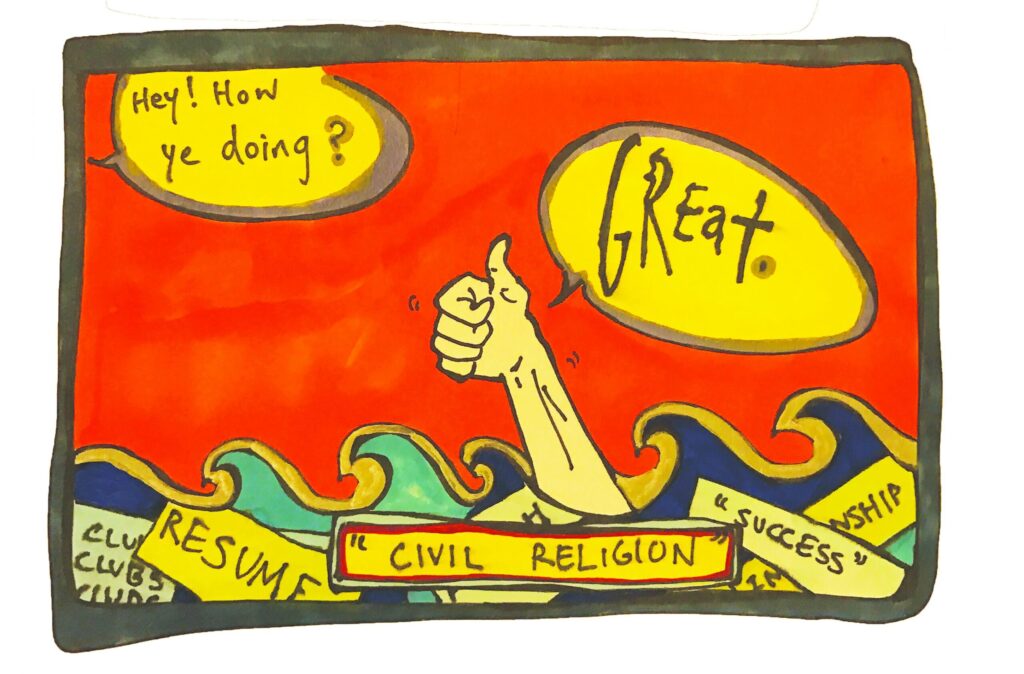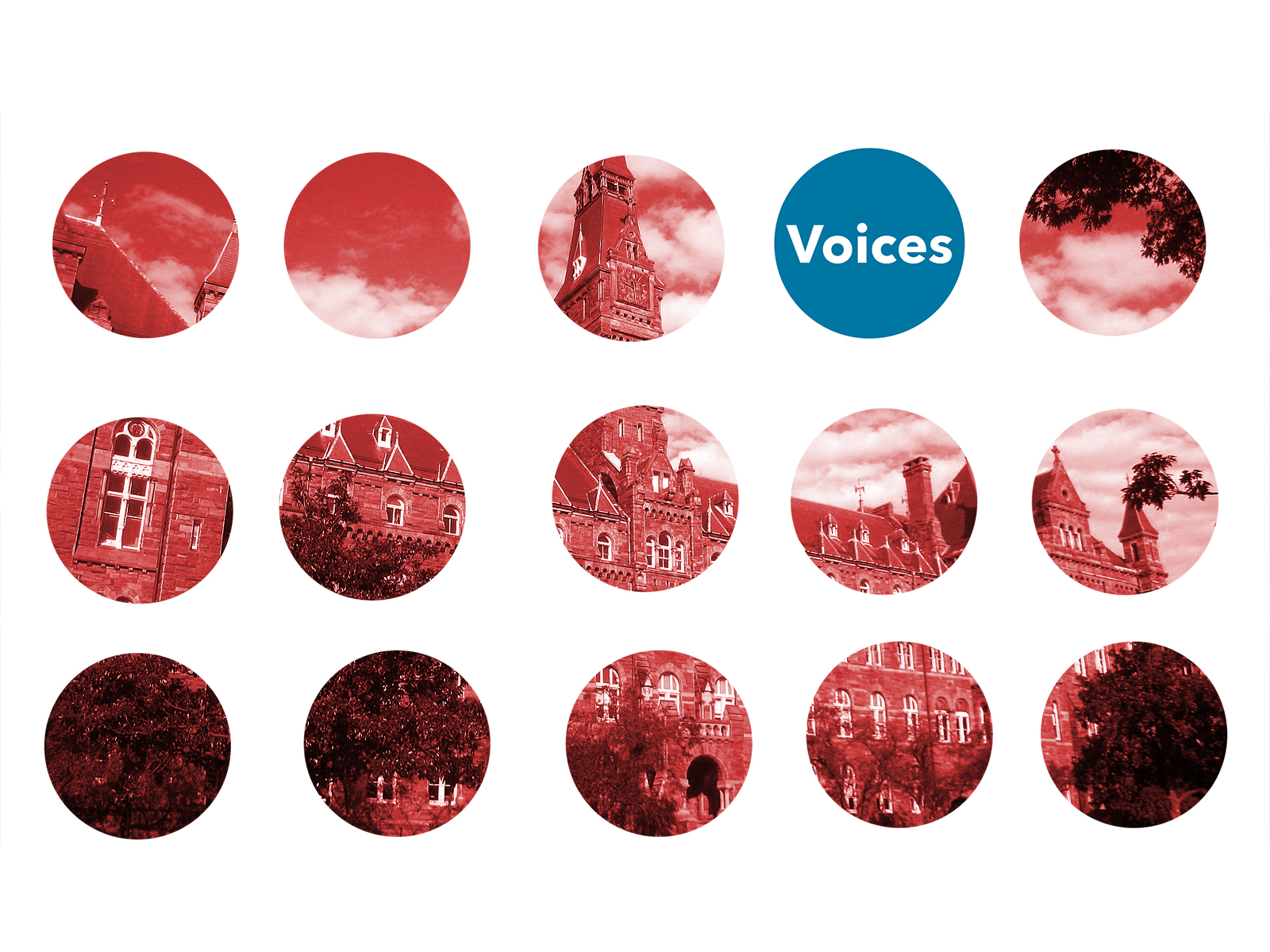Civil religion, as defined by sociologist Robert Bellah, is a set of common values and sacred symbols derived from national history that form a cohesive, quasi-religious faith within the United States. Americans accept this civil religion in accordance with certain fundamental values, beliefs, holidays, and symbols that are considered quintessentially American.
Bellah asserts that civil religion serves as a powerful force that fosters cultural integration, political legitimation, and social union. Examples of civil religious symbols entrenched in the American identity include the glorification of the military, the idolization of the founding fathers, and the recitation of the Pledge of Allegiance. A lot of unity and good does arise from civil religion, but despite this, it also serves as a powerful (but often latent) force to ostracize, otherize, and otherwise push people to the margins of public discourse.

Art by Sam Lee
Although civil religion is most commonly discussed in the public sphere of American life and politics, it can be analyzed by examining Georgetown University. Georgetown is an overtly religious institution, making it more difficult to critique the values and identity that it purports to espouse. If Georgetown were secular rather than religious, one would be hardpressed not to criticize the abundance of religious representations on campus. However, the values that the university does embody are divisive forces in the Georgetown community. While Georgetown may be a Catholic university, it is not exclusively a university for Catholics; Catholicism is a dominant tenet in the Georgetown identity despite the fact that many students are not Catholic.
Georgetown’s version of civil religion mainly resides in its 228 year tradition of Jesuit values, Catholic intellectualism, and religious pluralism. This message is generally well-received and paves the way for positivity, especially with Georgetown’s commitment to producing students who are men and women for others, as well as the university’s desire to build a diverse community of various backgrounds, faiths, cultures, and traditions.
Despite Georgetown’s stated message of inclusion and pluralism, the university continually falls short due to its inability, or perhaps refusal, to deviate from core tradition. This tradition and its consequential values are seen to be quintessentially Georgetown, but maybe being quintessentially Georgetown isn’t always a good thing.
It is understood and often repeated that Georgetown University is a Catholic institution. Students are reminded of this every time they go to class and see a crucifix hanging from the wall, walk past the graveyard planted firmly in the middle of campus, or pass a Jesuit priest adorned in his clerical shirt and collar. These Christian symbols exist on campus because of the traditions that shape the identity of the university. These traditions exist as a part of the civil religion of Georgetown itself. When overt religiosity is conflated with what it means to be a member of the Georgetown community, one can imply what it means to not embody the spirit of Georgetown. Bearing in mind that less than 50 percent of the student body adhere to the Roman Catholic faith, the university, by furthering public piety, is telling more than half of its students that their beliefs are not valued as highly as those of their Catholic peers.
Another problem indicative of Georgetown’s civil religion and Jesuit identity is its strict rejection of a woman’s right to choose. Nothing makes this as visible as the official recognition and funding of Georgetown University Right to Life (Georgetown’s pro-life student group), and the simultaneous lack of recognition for H*yas for Choice (Georgetown’s pro-choice student group). This value is furthered by the university in its explicit refusal to allow any officially recognized organization to distribute condoms or any type of birth control to students. During the spring semester, the university even sends out emails to the student body promoting a university-sponsored “Life Week.” The university creates a “fundamental identity” of what it means to be a Georgetown student around the religiously charged pro-life movement, thereby making pro-choice students feel excluded, unsupported, and unvalued.
Nevertheless, there are core values of Georgetown’s civil religion that are not religiously motivated, such as the innate desire by Georgetown students to be involved in campus life. There exists a social hierarchy in which a person is not truly considered to be successful if they’re not actively involved in at least two clubs and they don’t have an internship lined up after freshman year. The illusion of success is worshipped, and sacrifices of sleep and health are made at its altar. This holy spirit of involvement that is so important at Georgetown lends itself to a culture of stress and feelings of inferiority. Students who aren’t involved in the most prestigious clubs, don’t get the best grades, or aspire to be something other than CEO of J.P. Morgan fail to fit in among the lemmings of Georgetown. While being involved is undeniably a good thing, Georgetown ought to create an atmosphere where a future career and current welfare are not mutually exclusive.
Civil religion is often cleverly shrouded in dog whistles and buzzwords such as “patriotism” and “faith.” Civil religion’s latent ubiquity makes it all the more important to recognize it and understand its potential for dangerous discourse. In a broad sense, civil religion is a set of shared values which forms an identity that lends itself to social cohesion and self-fulfillment, but there is usually a more sinister side to any good thing. And with the unifying nature of civil religion comes the ostracizing side effect of creating a limited national, or communal, identity. At Georgetown, this identity is often based on religious elements, but not always. Students are categorized by the traditional whims of the institution and the aspirations of an overly ambitious student body. Oftentimes in the scramble to legitimize our own beliefs, we leave behind those that might challenge us to do better and to be better.
Correction: A previous version of this article referred to the group “Georgetown University Right to Life” as “Vita Saxa.” The article has been updated to reflect this correction.
Devon is a sophomore in the SFS.






